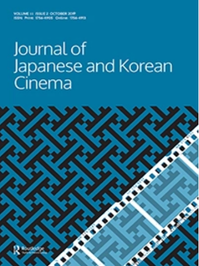News and Opinion
Continuing to Theorize the Theory Complex in Japanese Film Studies

As part of my long continuing project to study, appreciate, and disseminate the history of Japanese film theory, I recently penned an opinion piece for the Journal of Japanese and Korean Cinema at the request of Michael Raine, one of the editors. The result is a kind of sequel to the introduction to the special issue of the Review of Japanese Culture and Society that I edited on Japanese film theory, a piece entitled “Introduction: The Theory Complex” (now on the Yale repository). I want to thank Michael for the opportunity to revisit these issues.
About nine years have passed since that introduction, so this was a chance to consider the recent surge in research on Japanese theory, in both its positive and negative aspects. Here is the abstract for the opinion piece:
The recent surge in studies of Japanese film theory can be seen as an aspect of efforts to counter Eurocentrism in film studies and the aversion to theory in Japan studies. It could also help scholars think through the problem of utilizing theory in East Asian studies. Yet even if knowing the film theory of an era can help us understand the context of the films of that era, it should not simply serve as a sort of local informant for the foreign theorist. Just as there are problems in only rooting Japanese film theory in an age-old traditional aesthetics, there are issues in valuing that theory only to the degree it resembles Euro-American theory. That can lead to forms of theoretical ventriloquism or projected translations that only reinforce the geopolitics of theory centered in Europe. This can be a particular problem with Japanese film theory because it was caught between Japan’s imperial aspirations and Japan being subject to Euro-American neo-colonial influences. This “theory complex” can teach us much about the geopolitics of theory. Exploring Japanese film theory as a “minor film theory” may eventually even help “provincialize theory.”
In the same issue, there is another opinion piece by Daisuke Miyao on conceiving the transnational in Japanese cinema studies, a special section of articles on refugees, mothers, and children in Korean film, and (speaking of theory!) a translation of a 1941 article by Im Hwa (about whom I’ve written in an upcoming article).

